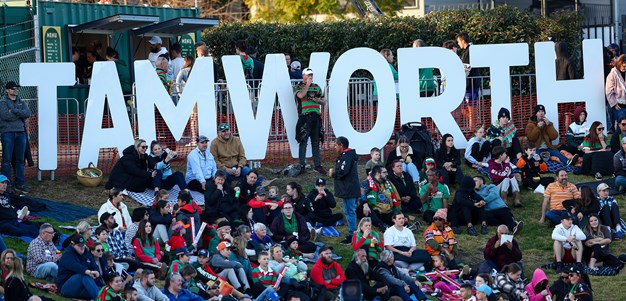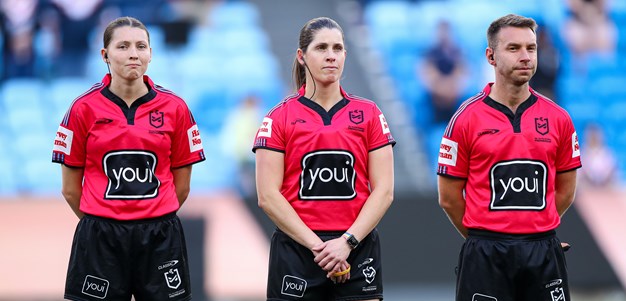Is it time to take the scheduling of the representative period more seriously?<br><br>That’s the question being asked by the Rugby League Players’ Association (RLPA) again this week as the opening State of Origin clash approaches.<br><br>Three weeks ago, Manly’s clash with St George Illawarra was overshadowed by the fact that 13 players were backing up from the Test match and City-Country games just 24 hours earlier. Two Dragons players – Michael Weyman and Jason Nightingale – failed to back up and were late scratchings from the game.<br><br>This week it happens again.<br><br>The Dragons host Parramatta at WIN Jubilee Stadium on Friday night with six players – Darius Boyd, Brett Morris, Matt Cooper, Michael Weyman, Ben Creagh and Neville Costigan – backing up from Origin.<br><br>The Eels have two in Jarryd Hayne and Timana Tahu.<br><br>Having already raised the issue of players’ workloads with the National Rugby League, RLPA chief executive David Garnsey told NRL.com that the coming weekend would again highlight the need for action to be taken.<br><br>“It’s not ideal, either for the players or for the spectacle of it,” Garnsey said.<br><br>“It’s a concern – burnout is a major issue in the game and it doesn’t necessarily hit the players now but it will hit them down the track having all of these close together games. <br><br>“It will accumulate and by the end of the season they won’t be as fresh as they should be. <br><br>“When you add the Four Nations at the end of the year and trial games at the start then a lot of the elite players haven’t had much of a break at all. <br><br>“It’s unhealthy for them to be doing that.”<br><br>Garnsey said the issue would be high on the agenda when he sits down with NRL boss David Gallop in the coming weeks to negotiate a new Collective Bargaining Agreement.<br><br>The current CBA expires on October 31.<br><br>“I think there should be a fresh look at how many games the players are being asked to play close together,” he said. <br><br>“It’s not the volume of games – although that’s an issue too – but more the backing up. <br><br>“Often the clubs don’t put pressure on their players to back up but the players do feel some loyalty to get back on the field. <br><br>“That’s not a situation they should be put in.”<br><br>Opinion is divided, however, between the needs of the players and the needs of rugby league in general.<br><br>Parramatta coach Daniel Anderson, whose side was upset by Cronulla last Saturday night in the absence of representative stars Hayne and Tahu, said it’s important that clubs put their own self interest aside as the NRL looks for new revenue streams to bolster the coffers and allay recent concerns by leading players over salary restrictions.<br><br>“The fact is that our fans want to support the game and the TV stations buy the rights to the game so both of those parties have significant influence over how many games there are,” Anderson said. <br><br>“It’s one of those things where we have to satisfy the stakeholders as well as the players. The stakeholders are very important. <br><br>“The clubs need to be financial and for them to be financial things have to be done. We have to play on Monday nights, we have to play rep games. <br><br>“The game needs to survive, money needs to be poured back into the grass roots – and a lot of that money comes from State of Origin. <br><br>“We can talk about stand-alone State of Origin games, or shortening seasons, but the game needs money to prosper.”<br><br>Anderson said that he was even open to the idea of extending the current 26-round season to 32 rounds – a concept first floated by Wests Tigers boss Stephen Humphries last week.<br><br>“I think anything should be investigated,” he said. <br><br>“I mean, we played three trials this year – if no clubs played trials that would help. <br><br>“People are going to investigate ways to generate more income and to increase the salary cap.<br><br>“Everything should be considered – nothing should be discounted until it has been properly looked into. <br><br>“To be honest, I don’t think (a longer season) is a horrible idea.”<br><br>The stumbling block for any change, of course, is the current television rights deal.<br><br>Although the NRL has managed to negotiate six ‘split rounds’ into the season, they would otherwise have to pay compensation to Channel 9 and/or Fox Sports if they fail to play eight games every weekend.<br><br>Conversely, clubs and players won’t take part in a longer season until they are adequately compensated.<br><br>“This is all wrapped up in the broadcasting deal, which makes it very difficult to do anything about it,” Garnsey said.<br><br>“The NRL has already indicated that they don’t want stand-alone State of Origin games, which makes it tricky too.<br><br>“So what can be done may be somewhat restricted – but it’s still something we’ll be talking about.”<br><br>In the meantime, Anderson said it was just a matter of waiting and hoping that his representative stars were fit and firing when they returned from Origin camp later this week.<br><br>“You just hope they’re okay,” he said. “We rely on the NSW medical staff quite a lot and if they’re okay they’ll come straight into the game on Friday.<br><br>“I’m not sure if there will be too many opportunities for them to have a team run with us, but they probably don’t need to.<br><br>“Medically they have to be cleared first and then if they’re emotionally and mentally ready to play, then you’re in: you’re playing.”
You have skipped the navigation, tab for page content

National Rugby League respects and honours the Traditional Custodians of the land and pay our respects to their Elders past, present and future. We acknowledge the stories, traditions and living cultures of Aboriginal and Torres Strait Islander peoples on the lands we meet, gather and play on.

